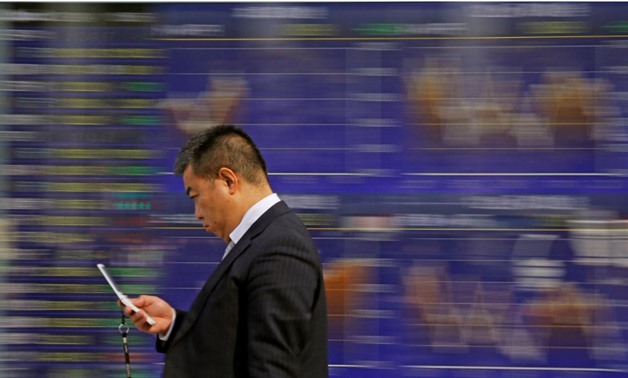
A man walks past an electronic stock quotation board outside a brokerage in Tokyo, Japan, February 9, 2018. REUTERS/Toru Hanai
TOKYO - 25 April 2018: Asian shares fell on Wednesday as a rise in U.S. bond yields above 3 percent and warnings from bellwether U.S. companies of higher costs drove fears that a boom in corporate earnings may be near its peak.
MSCI's broadest index of Asia-Pacific shares outside Japan .MIAPJ0000PUS dropped 0.3 percent, hitting their weakest in almost three weeks, with tech-heavy Taiwan shares .TWII slipping to two-month lows on worries about slowing semi-conductor demand. Japan's Nikkei .N225 dropped 0.2 percent.
European shares are expected to fall, with spread-betters calling a 0.7 to 0.9 percent drop in Britain's FTSE .FTSE, Germany's Dax .GDAXI and France's Cac .FCHI.
S&P E-mini futures ESc1 slipped 0.2 percent. Wall Street shares skidded overnight, with the S&P 500 .SPX slumping 1.34 percent, the most in two-and-a-half weeks.
Industrial heavyweight Caterpillar (CAT.N) beat earnings estimates due to strong global demand but its shares tumbled 6.2 percent after management said first-quarter earnings would be the “high water mark” for the year and warned of increasing steel prices.
“We’ve seen quite a lot of companies announcing above-estimate earnings and their shares falling sharply,” said Norihiro Fujito, senior investment strategist at Mitsubishi UFJ Morgan Stanley Securities.
Fujito noted major financial shares such as Goldman Sachs (GS.N) and Citigroup (C.N) as well as Google parent Alphabet GOOG.N, the first major tech firm to report earnings, have followed a similar pattern.
Corporate earnings are in solid shape, with analysts estimating 21.1 percent growth in the Jan-March quarter among U.S. S&P500 firms, according to Thomson Reuters data. A similar trend is expected globally.
“If shares are falling when corporate earnings are rising 20 percent and the economy is growing at 3 percent, the market is in trouble. The market reaction so far feels as if we are starting to see an end of its long rally since 2009. Investors could be thinking that the best time will be soon behind us,” he said.
Creeping gains in U.S. Treasury yields are fuelling fears that portfolio managers may move money into safer fixed-income securities at the expense of riskier assets like stocks and emerging markets.
The 10-year yield, a benchmark for global borrowing costs, has been driven steadily higher by a combination of concerns over inflation, growing debt supply, and rising Federal Reserve borrowing costs.
The 10-year U.S. Treasuries yield US10YT=RR rose to as high as 3.009 percent. A break of its January 2014 high of 3.041 percent could turn investors even more bearish.
Fed Funds rate futures prices <0#FF:> have been constantly falling this month, pricing in a considerable chance of three more rate hikes by the end of this year.
The impact is already reverberating in many emerging markets, with JPMorgan’s emerging market bond index .JPMEPR hitting a two-month low.
In Indonesia, a market with one of the largest exposures to foreign portfolio holdings, the authorities have been intervening heavily to put a floor under the rupiah IDR=, which has been flirted with two-year lows.
The Indian rupee hit a 13-month low INR=IN.
“Higher yields are no doubt having a negative impact on emerging markets. We are likely to see outflows from emerging market bonds,” said Takahiko Sasaki, market economist at Mizuho Bank.
The dollar also gained a tad against major currencies.
The euro stood at $1.2226 EUR=, not far from Tuesday's low of $1.2182, a low last seen on March 1.
The dollar traded at 108.87 yen JPY= after having jumped to a 2-1/2-month high of 109.20 yen on Tuesday.
The Australian dollar fell 0.4 percent to a four-month low of $0.7572 AUD=D4.
Against a basket of major currencies, the dollar index .DXY edged up 0.2 percent.
Oil prices were stable, but were below the more than three-year highs reached the previous session as rising U.S. fuel inventories and production weighed on an otherwise bullish market.
Brent LCOc1 fetched $73.86 a barrel, little changed on the day. On Tuesday it rose to $75.47, its highest since November 2014. West Texas Intermediate (WTI) crude CLc1 traded flat at $67.68.


Comments
Leave a Comment